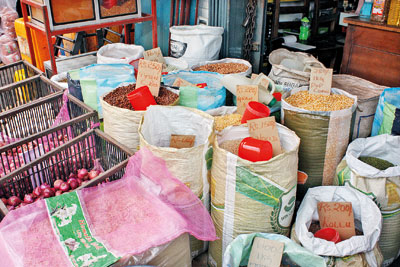News
Essential items hard to find and cost more despite price cuts

Consumers complain that they are forced to buy "essential commodities" from other shops and super markets at a higher price because most of the time the Sathosa shelves are empty. Pix by Nilan Maligaspe
The Trade Ministry might have reduced prices of 27 essential commodities but consumers trying to buy these goods say they cannot find them in shops, and when they do, the prices are higher.
Consumers complained that although the government said the 27 items were available at Lanka Sathosa and Co-operative Wholesale Establishments (CWE), they were generally sold out.
Missing from Sathosa and co-operatives’ shelves were rice varieties such as samba and nadu, they said, and they could not find lentils, sugar and wheat at government prices in supermarkets and grocers.
Virani Kulakurasuriya, 52, a resident of Hunupitiya, Wattala said she had been unable to buy most of the items stated to be “essential commodities” as they had been sold out.
 She complained that even though Sathosa sold sugar for the new price of Rs. 99 a kilo, it would only sell each buyer a maximum of two kilos.
She complained that even though Sathosa sold sugar for the new price of Rs. 99 a kilo, it would only sell each buyer a maximum of two kilos.
Shelves of tinned fish at Sathosa were generally empty so she had to always make a separate trip to a supermarket to buy these and other goods.
“When Sathosa doesn’t have the goods we go to local grocery shops and supermarkets, which have most of the essential items such as sugar, wheatflour, skinned chicken and lentils, but at high prices,” she said.
Cafe owner Kushan Samaranayake, whose shop is in Delkanda, said he was unable to buy rice and chicken for the concessionary prices as he often found Sathosa outlets had run out of stock.
“When running a business, I cannot wait until Sathosa re-stocks, so most of the time I have to buy the goods for high prices at supermarkets,” he said.
Meanwhile the grocery shop and supermarket owners said they were unable to provide the 27 essential goods at government-stipulated prices.
A shop owner who claimed anonymity said that his shop in Wattala was recently raided by the Consumer Affairs Authority for selling nadu rice for Rs. 120 rather than the stipulated price of Rs. 96.
He said he had been forced to sell the rice for the higher price as he had been forced to pay the large-scale miller who provided his stocks Rs. 112 for a kilo of nadu.
Shop owner Ajith Aruna Rawattawithana Kankanamge from Ambalangoda said he had stopped selling nadu and samba rice as he could not sell it at controlled prices.
Although the government was able to sell a kilo of sugar for Rs. 99 from Sathosa outlets, he added, grocers could only get sugar from wholesalers at Rs. 110 and were therefore forced to sell at a higher price.
His tale was echoed by supermarket manager A.W. Amalsha Udeen, who said he could not obtain keeri samba rice for Rs. 125 so was forced to buy at a higher price and sell it for Rs. 170 a kilo.
Shop-owners said large-scale millers made deals on the telephone with shop-owners to conditionally guarantee rice supplies. Retailers who say that although they had, over the years, given business worth hundreds of thousands of rupees to millers, they were being treated shabbily, with millers delaying deliveries of some rice varieties in order to coerce shops into ordering higher-priced varieties.
The Consumer Affairs Authority (CAA) said its officers were making more raids on grocery shops to encourage owners not to buy rice on the millers’ terms.

The CAA spokesman said when mills were raided, millers complained that retailers were keeping prices high by hoarding stocks.
Lanka Sathosa Chairman, Rear Admiral (Retd) Ananda Peiris admitted there was a shortage of samba rice at Sathosa outlets and said this was because of a delay at the relevant miller’s end.
He explained the shortage of tinned fish was due to a shipment of imported tinned fish having to be returned due to the detection of arsenic in the product.
Chairman Peiris said sales at Sathosa outlets had doubled due when the controlled prices had been brought in, so that was why stocks were low.
The Minister of Trade, Bandula Gunawardena, said the government planned to increase the list of price-controlled essential commodities to 34 products in coming weeks.
The minister said the public could call the 1998 complaints hotline to report shortages at Sathosa outlets or co-operatives.


